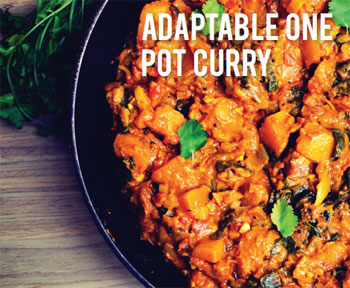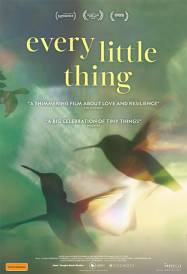Adaptable One Pot Curry

Adaptable One Pot Curry
Serves 4
Hands on time: 30 minutes
Hands off time: 40 minutes
Ingredients
4 tbsp neutral oil
1 tsp black mustard seeds
1 tsp cumin seeds
2 medium onions, finely chopped
4 cloves garlic, finely chopped
1 thumb ginger, finely chopped
2 tsp ground cumin
2 tsp ground coriander
2 tsp turmeric powder
½-2 tsp chilli powder (depending on your heat tolerance)
1½ 400g/14oz can chickpeas, drained
½ a butternut squash, peeled and cut 1 inch dice, parboiled (see step 6)
OR
1 cup (160g) dried red lentils, rinsed
OR
3 medium baking potatoes, cut into 1 inch cubes, parboiled (see step 6)
400g/14oz can chopped tomatoes
½ 400g/14oz can light coconut milk
½ can water (=200ml/a bit less than 1 cup)
OR
½ 400g/14oz can chopped tomatoes
400g/14oz can light coconut milk
½ can water (=200ml/a bit less than 1 cup)
1 large handful baby spinach or curly kale
A few leaves of fresh coriander
Method
In a large pot or casserole dish, heat the oil over a high heat.
Fry the black mustard and cumin seeds until the mustard seeds start to pop, about 1-2min.
Turn the heat down to medium and add the onions. Sweat them for 5 minutes.
Now add the ginger and garlic. Fry for another 5 minutes.
Stir in the ground cumin, ground coriander, turmeric and chilli powder. Cook for another 5 minutes.
Add your bulk ingredient. If using potatoes or butternut squash, steam or boil them for about 5-8 minutes to parboil them.
Add your choice of liquid: for a tomatoey curry use 1 can tomatoes + ½ can light coconut milk or for a coconuts' one the other way around. Then add ½ can water.
Bring to a boil, then turn down the heat and simmer for 15 minutes.
Stir in the spinach or kale until it wilts (a few min).
Check to see if your potatoes, butternut squash or lentils are well cooked.
Sprinkle over the garam masale and season with salt and lemon juice to taste.
Garnish with fresh coriander leaves and serve with rice,naan bread or roti.
Three's A Crowd For Planet Earth
Research reveals current rates of meat consumption across the globe means we'll soon require three planets to feed us
Research has found, if the world continues consuming meat at its current rate, we would soon need 3 earths just to feed us. With the population set to increase by 30% to over 11 billion people by 2050ii, the situation is only set to worsen. Even if the world could stop food waste entirely, food production would still need to increase by 60% in order to feed this larger, wealthier and urban population. That means a meat production of over 200 million tonnes at the current rate of consumption.
Dr Joanna McMillan, nutrition scientist, says 'it's much easier to do than you think just fill up on greens, beans and vegetables. In many parts of the world, people who are the longest-lived, consume a largely plant-based diet with small amounts of meat. In Sardinia for example meat is mostly reserved for Sundays and special occasions, while in Okinawa seafood is far more common than meat."
'Good quality red meat does offer valuable nutrition but many of us eat far bigger portions than we need and not enough plant food. If when eating meat, you stick to a portion the size of the palm of your hand and fill half your plate with veggies, and opt for a least one vegetarian meal a week, you're on the right track to longevity", continued Dr McMillan.
It has now been widely acknowledged that we cannot meet our meat demand in a sustainable or ethical wayiii. To avoid the planet's food production reaching critical levels, the 12th June hopes to help the world make a long-term behaviour change to eating less and better quality meat, as well as incorporating a greater variety of vegetables, grains, pulses and plant based foods into their diets.
To put things into perspective, if the entire Australian population tried just one meat free recipe, we'd save:
The carbon equivalent of the annual power use of 4,467 households
The land saving of 8,532 rugby fields
The water equivalent of 1,564 Olympic sized swimming pools
The world's focus is already turning towards a more -flexitarian' approach to eating as we incorporate more plant based ingredients into diets than ever before. According to recent Mintel findings, 30% of US adults who purchase vegetables are actively trying to eat a more plant-based dietiv, while 29% of UK already claimv to have reduced their meat intake in the past year alone.
This year's drive comes off the back of two hugely successful years of the campaign, which saw #WorldMeatFreeDay trend for over 36 hours on Twitter, reaching over 84 million people last year alone. With high profile vegan or vegetarians already including the likes of Beyoncé, Jay Z, Gwyneth Paltrow, Ellen DeGeneres, Paul McCartney and Natalie Portman, World Meat Free Day hopes to continue gathering momentum to dramatically improve the health of our already fragile planet.
Joanna Lumley, Actress, commentated: 'I support World Meat Free Day with all my heart. Just a day without eating meat might encourage people to think again how best we can save the planet and stop cruelty to our fellow creatures at the same time."
Across the world, people will be invited to pledge their support via the -I'm in' button on the World Meat Free Day website, as well getting involved on social media via the official #WorldMeatFreeDay and @Meat_Free_Day.
For more information about World Meat Free Day, visit: www.worldmeatfreeday.com
MORE



